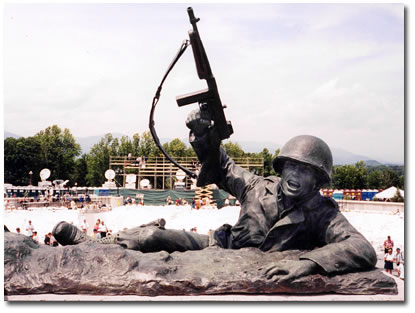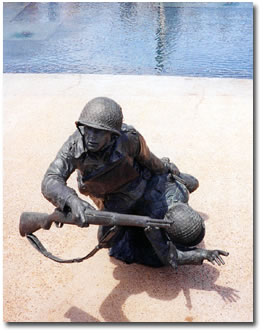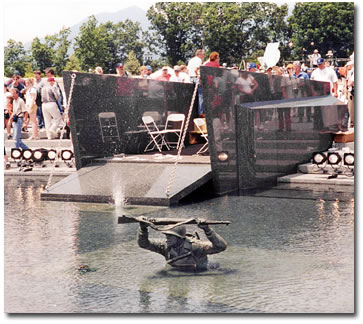|
|
'The Longest Day' — Memorial honors thousands
killed on D-Day |
|
|
|
 |
 |
 |
| Above is one of many
bronze American soldier sculptures located
at the National D-Day Memorial in Bedford,
Va. (Photo Copyright © 2001-2004 by
Vincent Z. Whaley) |
By Vincent Z. Whaley
Johnson
City Press Staff Writer
(Published Sunday, June 17, 2001)
BEDFORD, Va. — With the opening of the National
D-Day Memorial here, the world now has an official
site to pay tribute to the thousands killed and
wounded during the 1944 invasion of Nazi-held
Europe in Normandy, France.
Joining President Bush on June 6, 2001, a crowd
of about 20,000 veterans and their families, loved
ones of war dead, European residents, history
connoisseurs and media attended the dedication
of the memorial on the 57th anniversary of D-Day.
And if the dedication ceremony was any indication,
the memorial will prove to be more than just a
place to remember the sacrifices of D-Day. With
an estimated 1,000 World War II soldiers dying
daily, the majority of participants consisted
of baby boomers and their sons and daughters sharing
war stories about their fathers and grandfathers.
 |
|
Sculptures
depict GIs wading ashore Omaha Beach in
the memorial's "Reflecting Pool."
(Photo Copyright © 2001-2004 by Vincent
Z. Whaley)
|
Gripping a framedphotograph
of his father, Tech. Sgt. George Burton Chumbley,
4th "Ivy" Infantry Division, and joined
by his mother and brother, Richard Chumbley, of
Draper, said his father was wounded in July 1944
by shrapnel wounds to the shoulder.
"It was a traumatic time in 1944," he
said. "People today have no idea what the
soldiers went through. Dad went ashore Utah Beach
on D-Day, but luckily made it back home at the
end of the war. He died in 1992. I owed it to
Dad to be here today. He couldn't make it, so
I did."
Chumbley's brother, David, was born on Aug. 9,
1944. He was 9 months old before his father saw
him.
"It's amazing any of them got back home,"
he said.
On D-Day, the Normandy beaches were code-named
Gold, Juno, Sword, Omaha and Utah. More than 2,000
American soldiers perished on June 6, 1944, at
Omaha and Utah beaches. The invasion consisted
of soldiers and sailors from 12 Allied nations
forming the larhest air, land and sea armada in
history.
Spanning more than eight acres, the National D-Day
Memorial's centerpiece is a 44-foot-, 6-inch-high
granite arch, symbolizing the date of the invasion.
The arch bears the military code name of the operation,
OVERLORD, and black and white invasion stripes
applied to airplanes to help the Allies distinguish
between friend and foe.
The second level of the memorial offers a replica
of a German bunker facing bronze sculptures of
American soldiers storming Omaha Beach, where
the majority of American casualties were inflicted.
The bronze American soldier sculptures and a model
of a personnel landing craft — also known
as a Higgins boat — are surrounded by a granite
reflecting pool of blue water and concrete yellow
sand. Underwater jets shoot intermittent small
sprays of water to resemble German gunfire upon
the invasion beach.
 |
|
A
Higgins Boat and underwater jets depict
the Normandy, France, landing along with
sculptures of GIs wading ashore in the
memorial's
"Reflecting Pool." (Photo Copyright
© 2001-2004 by Vincent Z. Whaley)
|
A plaza circling the pool is flanked by tall concrete
walls that soon will display the names of approximately
6,000 soldiers killed on D-Day.
The National D-Day Memorial Foundation also plans
to eventually offer an amphitheater, named in
honor of director Steven Spielberg's father, Arnold
— a World War II veteran who flew Army Air
Corps missions — and a 49,000-square-foot
education center. Spielberg, who gave contributions
for the memorial's construction, won a best director
Academy Award for his film Saving Private Ryan,
which depicted the D-Day invasion at Omaha Beach.
Philippe Gouf, who traveled from France with about
30 Normandy residents to attend the June 6 memorial
dedication ceremony, still clearly remembers the
long-awaited liberation of Europe.
"I was a student in Caen (located about 30
miles from Omaha Beach), and my mother, father
and brother were in our home approximately 700
meters from the sea at Omaha Beach when the invasion
began," he said.
"Our home was completely burned on June 7,
D-Day-plus-one. I eventually returned to my home
to find it empty. I rebuilt the home, and today
I work in Paris and live in my childhood home
at Omaha Beach."
The $14 million, nine-acre National D-Day Memorial
was constructed atop the highest hill in Bedford
— a small Southwest Virginia town that lost
21 of its 35 soldiers on D-Day. Nineteen Bedford
soldiers died within the first 15 minutes of the
invasion; two more died later on "the longest
day." Historians say the 21 deaths from a
town with a population of 3,200 in 1944 make Bedford's
the highest per-capita loss from any community
in the United States on D-Day.
Recognizing Bedford as "just the right place"
for the memorial, Bush, during his dedicatory
address, said Gen. Dwight D. Eisenhower's order
of the day remains as "gratitude" nearly
six decades later.
"Fifty-three hundred ships and landing craft,
1,500 tanks, 12,000 airplanes. But in the end,
it came down to this: Scared and brave kids by
the thousands who kept fighting and kept climbing
and carried out General Eisenhower's order of
the day — nothing short of complete victory,"
the president said.
"Today we give thanks for all that was gained
on the beaches of Normandy. We remember what was
lost with respect, admiration and love."
On the Net: www.dday.org
Related VZW story: Network
Makes Father's Day easier for war orphans
Click here for more photos from the June 6, 2001,
National D-Day Memorial Dedication Ceremony
Story and Photographs
Copyright © 2001-2004 by Vincent Z. Whaley
and the Johnson
City Press,
204 W. Main St., Johnson City, Tennessee 37605,
423.929.3111.
All rights reserved. This material may not
be published, broadcast, rewritten or redistributed.
|
|
 |
|
|
|
|
|
|
|